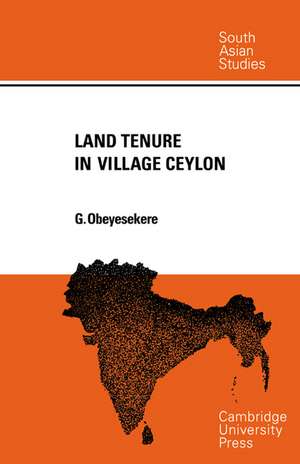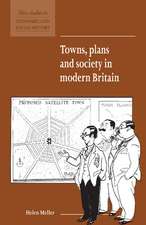Land Tenure in Village Ceylon: A Sociological and Historical Study: Cambridge South Asian Studies, cartea 4
Autor Gananath Obeyesekereen Limba Engleză Paperback – 3 feb 2008
Din seria Cambridge South Asian Studies
-
 Preț: 238.21 lei
Preț: 238.21 lei -
 Preț: 324.05 lei
Preț: 324.05 lei -
 Preț: 355.89 lei
Preț: 355.89 lei -
 Preț: 328.70 lei
Preț: 328.70 lei -
 Preț: 286.84 lei
Preț: 286.84 lei -
 Preț: 404.48 lei
Preț: 404.48 lei -
 Preț: 282.42 lei
Preț: 282.42 lei -
 Preț: 315.95 lei
Preț: 315.95 lei -
 Preț: 272.09 lei
Preț: 272.09 lei -
 Preț: 315.41 lei
Preț: 315.41 lei -
 Preț: 314.65 lei
Preț: 314.65 lei -
 Preț: 316.74 lei
Preț: 316.74 lei -
 Preț: 274.54 lei
Preț: 274.54 lei -
 Preț: 273.61 lei
Preț: 273.61 lei -
 Preț: 280.79 lei
Preț: 280.79 lei -
 Preț: 280.04 lei
Preț: 280.04 lei -
 Preț: 281.17 lei
Preț: 281.17 lei -
 Preț: 323.07 lei
Preț: 323.07 lei -
 Preț: 285.83 lei
Preț: 285.83 lei -
 Preț: 278.90 lei
Preț: 278.90 lei -
 Preț: 280.25 lei
Preț: 280.25 lei -
 Preț: 267.17 lei
Preț: 267.17 lei -
 Preț: 282.71 lei
Preț: 282.71 lei -
 Preț: 355.90 lei
Preț: 355.90 lei -
 Preț: 351.77 lei
Preț: 351.77 lei -
 Preț: 282.49 lei
Preț: 282.49 lei -
 Preț: 288.78 lei
Preț: 288.78 lei -
 Preț: 281.17 lei
Preț: 281.17 lei -
 Preț: 281.17 lei
Preț: 281.17 lei -
 Preț: 274.54 lei
Preț: 274.54 lei -
 Preț: 392.83 lei
Preț: 392.83 lei -
 Preț: 277.79 lei
Preț: 277.79 lei -
 Preț: 279.45 lei
Preț: 279.45 lei -
 Preț: 342.43 lei
Preț: 342.43 lei -
 Preț: 420.35 lei
Preț: 420.35 lei -
 Preț: 269.08 lei
Preț: 269.08 lei -
 Preț: 327.37 lei
Preț: 327.37 lei -
 Preț: 279.84 lei
Preț: 279.84 lei -
 Preț: 276.61 lei
Preț: 276.61 lei -
 Preț: 321.86 lei
Preț: 321.86 lei -
 Preț: 333.17 lei
Preț: 333.17 lei -
 Preț: 319.77 lei
Preț: 319.77 lei -
 Preț: 276.47 lei
Preț: 276.47 lei -
 Preț: 237.14 lei
Preț: 237.14 lei -
 Preț: 360.82 lei
Preț: 360.82 lei
Preț: 282.49 lei
Nou
Puncte Express: 424
Preț estimativ în valută:
54.08€ • 56.21$ • 44.84£
54.08€ • 56.21$ • 44.84£
Carte tipărită la comandă
Livrare economică 07-21 februarie 25
Preluare comenzi: 021 569.72.76
Specificații
ISBN-13: 9780521053259
ISBN-10: 0521053250
Pagini: 348
Dimensiuni: 153 x 228 x 19 mm
Greutate: 0.44 kg
Editura: Cambridge University Press
Colecția Cambridge University Press
Seria Cambridge South Asian Studies
Locul publicării:Cambridge, United Kingdom
ISBN-10: 0521053250
Pagini: 348
Dimensiuni: 153 x 228 x 19 mm
Greutate: 0.44 kg
Editura: Cambridge University Press
Colecția Cambridge University Press
Seria Cambridge South Asian Studies
Locul publicării:Cambridge, United Kingdom
Cuprins
1. Introducing Madagama; 2. The ideal model of land tenure; 3. The traditional laws of inheritance; 4. The diachronic devolution of the share system; 5. Factors of change; 6. Genealogy as a charter of rights; 7. The share market; 8. The ideal scheme in contemporary application; 9. The ideology of status and the formation of `Peldntiya'; 10. Kinship, residence and land tenure; 11. The theoretical and methodological background of the study.
Descriere
This anthropological work describes the pattern of land tenure and resulting social structure in the Ceylonese village of Madagama.















